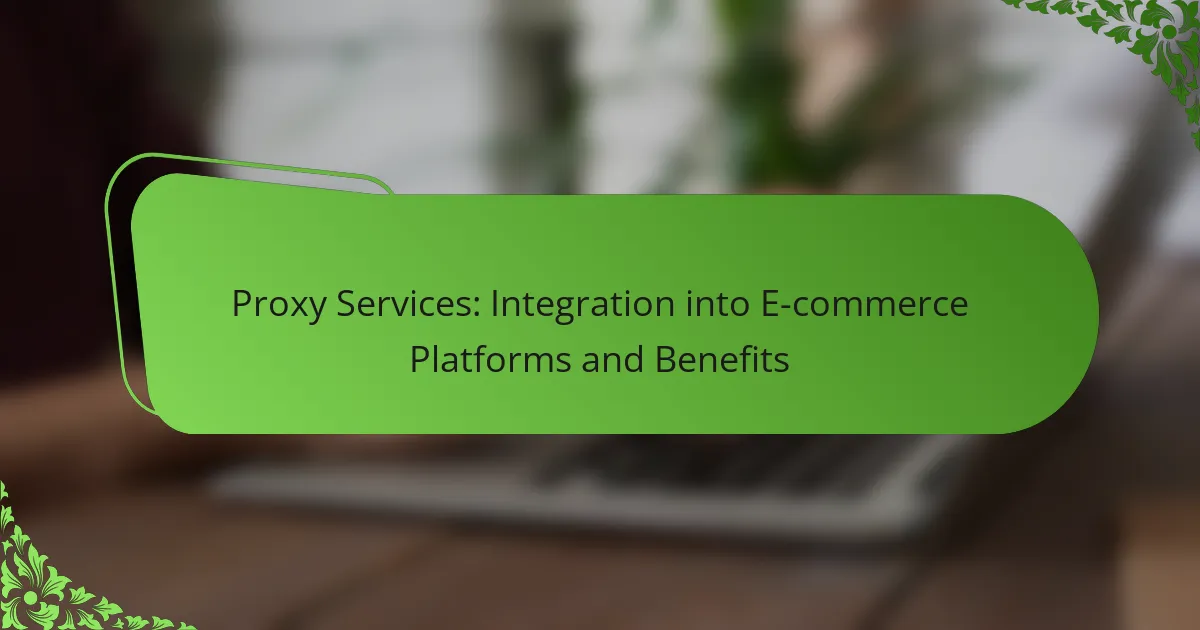Integrating proxy services into e-commerce platforms can significantly enhance security, streamline data collection, and unlock access to geo-restricted content. By leveraging these benefits, businesses can operate more efficiently and securely in the competitive online marketplace. Popular platforms like Shopify, WooCommerce, and Magento facilitate this integration, allowing retailers to optimize their operations and improve customer interactions.
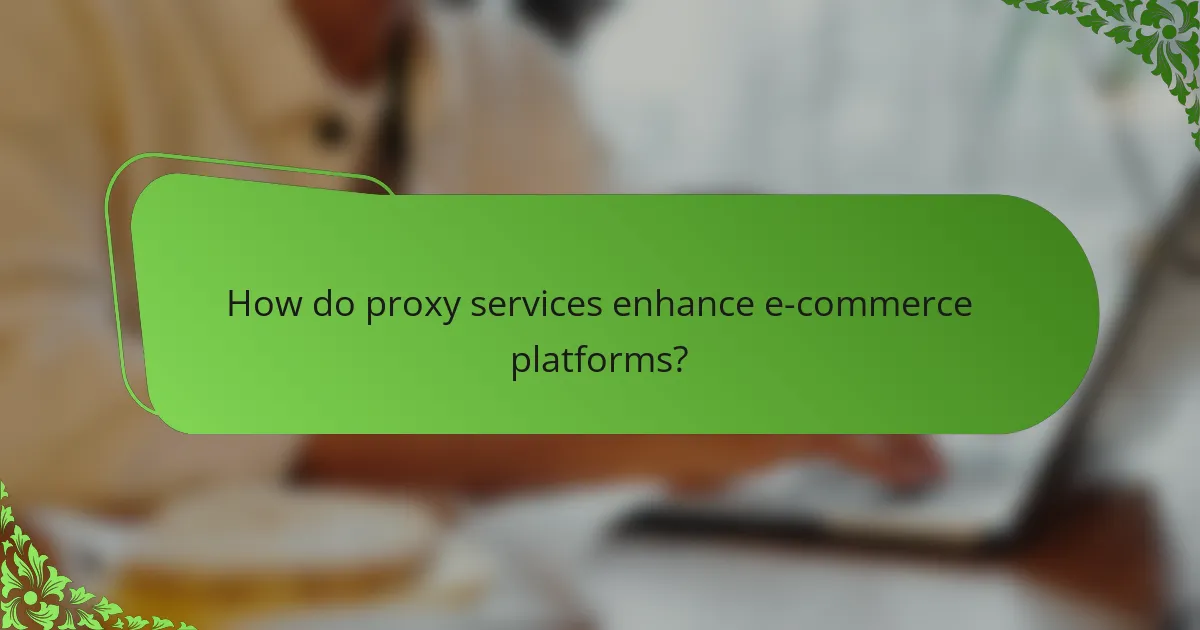
How do proxy services enhance e-commerce platforms?
Proxy services enhance e-commerce platforms by providing improved security, faster data collection, and access to geo-restricted content. These benefits enable businesses to operate more efficiently and securely in a competitive online environment.
Improved security and anonymity
Using proxy services can significantly enhance the security and anonymity of e-commerce transactions. By masking the IP addresses of users, proxies help protect sensitive information from potential cyber threats, such as hacking or data breaches.
Additionally, proxies can distribute requests across multiple servers, reducing the risk of DDoS attacks and ensuring that the e-commerce platform remains operational even during high traffic periods. This layer of security is crucial for maintaining customer trust and safeguarding financial transactions.
Faster data scraping for competitive analysis
Proxy services enable faster data scraping, which is essential for competitive analysis in e-commerce. By routing requests through various IP addresses, businesses can gather data from competitor websites without being blocked or throttled.
This capability allows e-commerce platforms to monitor pricing, inventory levels, and promotional strategies in real-time, giving them a competitive edge. Companies can quickly adapt their strategies based on the insights gained from this data, improving their market positioning.
Access to geo-restricted content
Proxy services provide access to geo-restricted content, allowing e-commerce platforms to reach a broader audience. By using proxies located in different countries, businesses can view and analyze content that may not be available in their region.
This access is particularly useful for understanding local market trends, customer preferences, and pricing strategies in various regions. It enables e-commerce platforms to tailor their offerings and marketing efforts to specific demographics, enhancing overall sales potential.
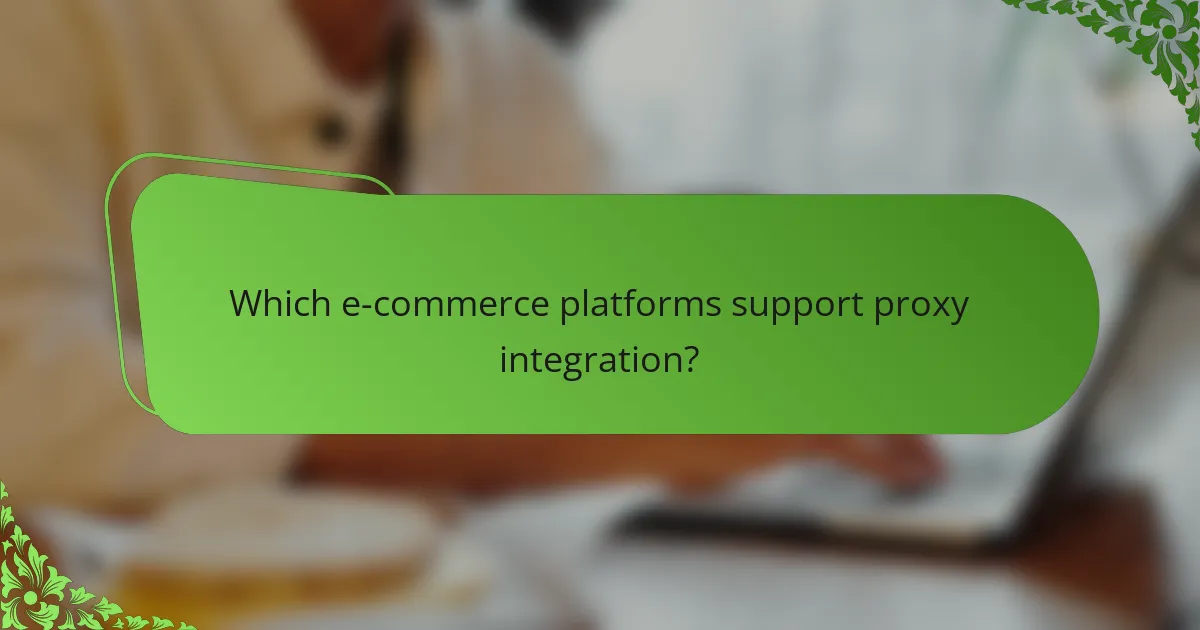
Which e-commerce platforms support proxy integration?
Several popular e-commerce platforms support proxy integration, allowing businesses to enhance their online operations. Key platforms include Shopify, WooCommerce, and Magento, each offering unique features for utilizing proxy services effectively.
Shopify proxy integration
Shopify provides seamless proxy integration through various apps available in its App Store. These apps help users manage their online store’s data scraping and automation tasks while maintaining security and speed.
When integrating proxies with Shopify, consider using rotating proxies to avoid IP bans and ensure consistent access to competitor data. Choose a reliable proxy provider that offers high uptime and fast response times to optimize your store’s performance.
WooCommerce proxy solutions
WooCommerce, a popular WordPress plugin, supports proxy integration through various third-party services. Users can implement proxies to enhance data collection for market analysis and improve site performance during high traffic periods.
For WooCommerce, it’s essential to select proxies that are compatible with WordPress and offer features like geo-targeting. This allows businesses to tailor their marketing strategies based on regional data, improving customer engagement.
Magento proxy compatibility
Magento supports proxy integration, allowing users to enhance their e-commerce capabilities. By utilizing proxies, Magento users can efficiently manage data scraping, improve site speed, and protect their online store from malicious attacks.
When integrating proxies with Magento, ensure that the chosen proxy service is optimized for Magento’s architecture. Look for features like dedicated IP addresses and high bandwidth to ensure smooth operation and avoid downtime during peak shopping seasons.
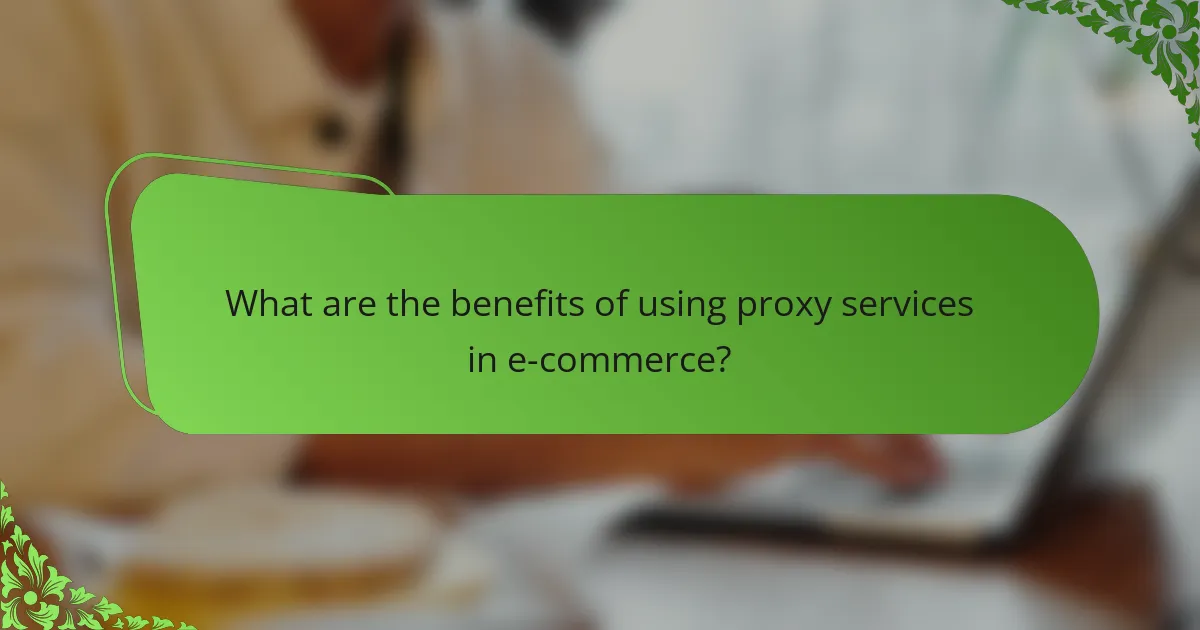
What are the benefits of using proxy services in e-commerce?
Proxy services offer significant advantages for e-commerce businesses by enhancing security, improving user experience, and providing valuable market insights. These services allow online retailers to manage customer interactions more effectively while safeguarding sensitive data.
Enhanced user experience
Using proxy services can significantly enhance the user experience by ensuring faster load times and reduced latency. By routing traffic through optimized servers, e-commerce platforms can deliver content more quickly, which is crucial for retaining customers.
Additionally, proxies can help in personalizing the shopping experience by allowing businesses to analyze user behavior and preferences without compromising privacy. This targeted approach can lead to more relevant product recommendations and a smoother checkout process.
Increased conversion rates
Proxy services can lead to increased conversion rates by minimizing downtime and ensuring that users can access the site without interruption. A reliable proxy can handle high traffic volumes, especially during peak shopping seasons, which helps maintain a seamless shopping experience.
Moreover, by utilizing proxies for A/B testing and market research, businesses can optimize their websites based on real-time data, leading to more effective marketing strategies and higher sales conversions.
Better market insights
Proxies enable e-commerce businesses to gather better market insights by allowing them to scrape competitor data and analyze market trends without revealing their identity. This anonymity helps in collecting valuable information that can inform pricing strategies and product offerings.
Furthermore, proxies can facilitate access to geo-restricted data, enabling businesses to understand regional market dynamics and consumer preferences. This can be particularly beneficial for companies looking to expand into new markets or tailor their offerings to specific demographics.
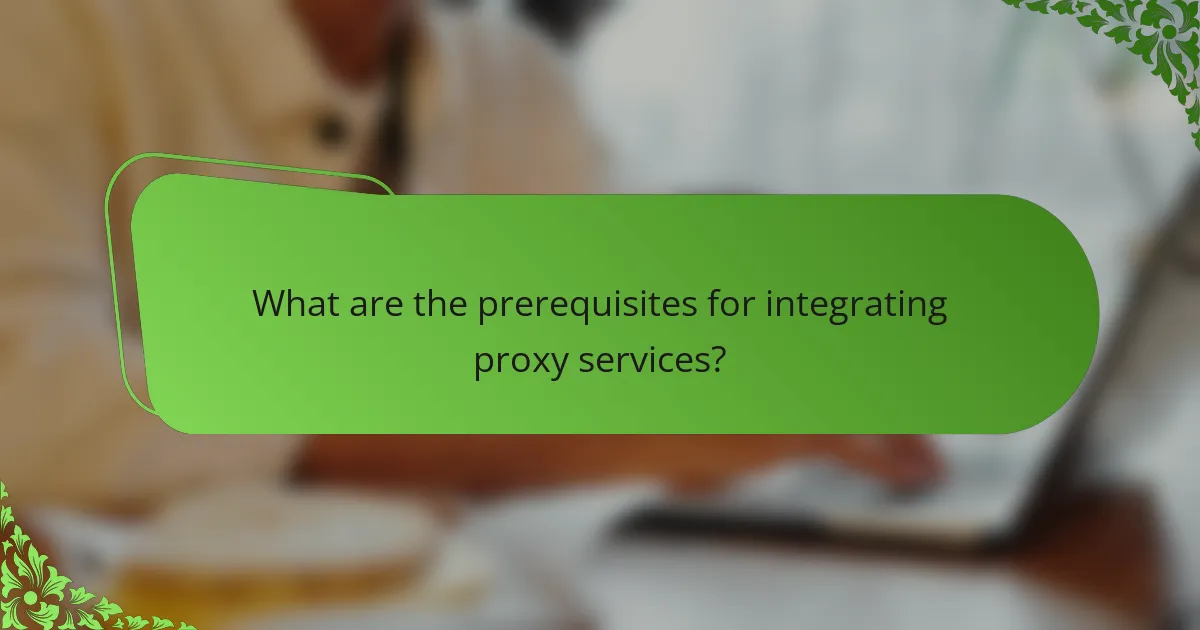
What are the prerequisites for integrating proxy services?
Integrating proxy services into e-commerce platforms requires a clear understanding of technical requirements and the selection of appropriate providers. Key prerequisites include assessing API compatibility and identifying reliable proxy services that meet your business needs.
Understanding API requirements
API requirements are critical for successful integration of proxy services. Ensure that your e-commerce platform’s API can handle requests through proxies, which may involve modifying existing endpoints or creating new ones. Review documentation for both your platform and the proxy service to confirm compatibility.
Consider the data formats and authentication methods required by the proxy. For instance, some proxies may require specific headers or tokens, while others might support standard authentication protocols. Testing these integrations in a staging environment can help identify potential issues before going live.
Identifying suitable proxy providers
Selecting the right proxy provider is essential for maintaining performance and security. Look for providers that offer a range of proxy types, such as residential, data center, or mobile proxies, depending on your needs. Evaluate their uptime guarantees, speed, and geographical coverage to ensure they align with your target market.
Additionally, consider the pricing structure of proxy services. Some providers charge based on bandwidth usage, while others may have flat-rate plans. Compare these options to find a solution that fits your budget while still delivering the necessary performance. Reading reviews and seeking recommendations can also help in making an informed choice.
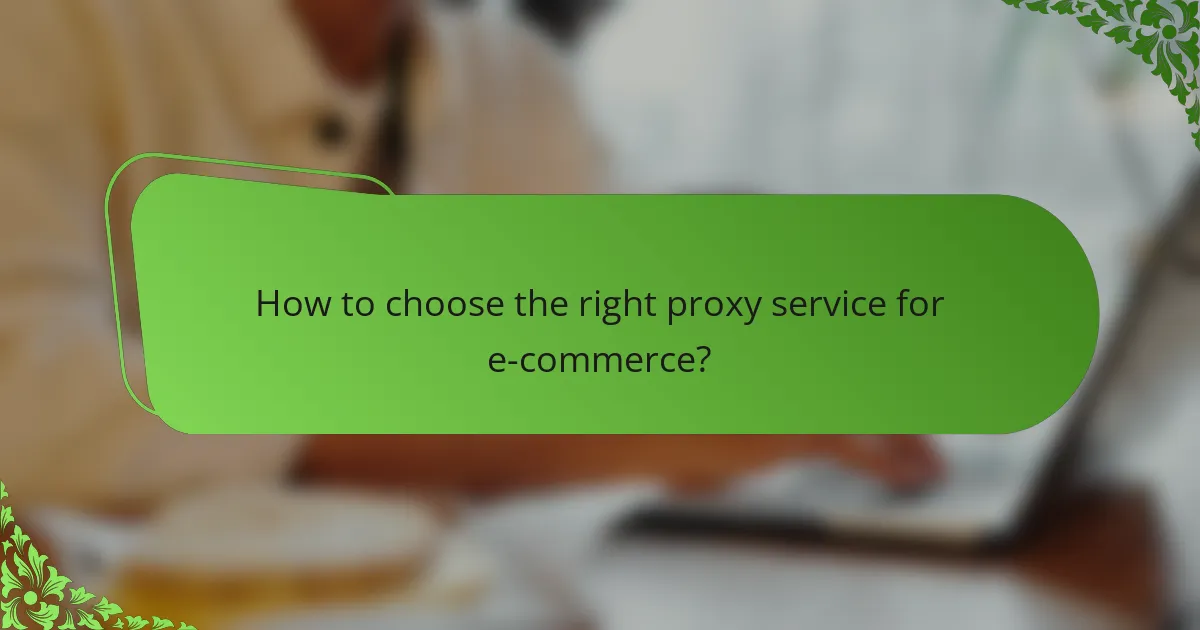
How to choose the right proxy service for e-commerce?
Choosing the right proxy service for e-commerce involves evaluating key factors such as speed, pricing, and customer support. A well-selected proxy can enhance your online operations by improving security, enabling web scraping, and managing multiple accounts effectively.
Evaluating speed and reliability
Speed and reliability are critical when selecting a proxy service for e-commerce. Look for providers that offer low latency and high uptime, ideally above 99%. This ensures that your online transactions and data retrieval processes run smoothly without interruptions.
Consider testing the proxy service with a trial period to assess its performance under real-world conditions. A reliable proxy should maintain consistent speeds even during peak traffic times, which is essential for maintaining a seamless shopping experience for customers.
Assessing pricing models
Pricing models for proxy services can vary significantly, so it’s essential to understand what you’re paying for. Common models include pay-as-you-go, monthly subscriptions, and tiered pricing based on usage. Evaluate which model aligns best with your e-commerce needs and budget.
For example, if your business requires high data volume, a monthly subscription might be more cost-effective than a pay-as-you-go plan. Always compare the features included in each pricing tier to ensure you’re getting the best value for your investment.
Checking customer support options
Effective customer support is vital for resolving issues quickly and minimizing downtime. Look for proxy services that offer 24/7 support through multiple channels, such as live chat, email, and phone. This accessibility can be crucial during peak shopping seasons or when technical difficulties arise.
Additionally, check for user reviews regarding the responsiveness and helpfulness of the support team. A provider with a strong reputation for customer service can save you time and frustration, allowing you to focus on your e-commerce operations.






